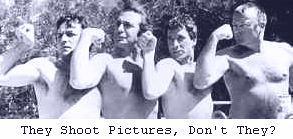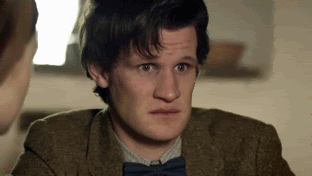We've made our way to The 400 Blows, a 1959 classic of the French New Wave movement and Francois Truffaut's feature film debut. It's a (mostly) autobiographical film about a somewhat troubled adolescent growing up in Paris. The 400 Blows scores an impressive #36 spot on the Top 1000 list.
Full Disclosure: So, I have another confession to make. Most of you probably know that I studied film in college, but...I wasn't exactly the best film student ever. When we were assigned three movies to watch every single week, sometimes I just...didn't. I know that The 400 Blows was definitely on at least one or two syllabuses, but I just never got around watching it. Please don't tell any of my professors.
Antoine has had kind of a rough childhood. At school, he is often punished for things that aren't necessarily his fault, and he gets bad marks. At home, no one really seems to like him all that much, especially his mother. Everyone thinks he's a troublemaker (and to be fair, he's no angel).
His life changes, however, when he tells a teacher that his mother died so he won't get in trouble for skipping school the day before. It takes only hours for his lie to come out, and his parents show up at the school, warning him that he will be punished when he goes home. Side-stepping this issue, Antoine decides not to go home, and spends the night at a printing factory. The next day when he goes to school, however, his worried parents come to pick him up. His mother is apparently trying a different tack, and is open with him about her own rowdy childhood. She makes a deal with him that if does well on his next paper, she'll give him 1000 francs.
Antoine gets in trouble for cheating on the paper (it seems that he inadvertently plagiarized part of a famous story that he had been reading before), but instead of going to the principal's office, he runs away. For a while he stays at his friend Rene's house, whose parents are rich but inattentive, and the two make plans to steal a typewriter from Antoine's father's office. Then they can sell it and make enough money to leave Paris (I guess).
They succeed in stealing the typewriter, but they are unable to sell it. Antoine feels guilty and decides to return it, but he is caught by the night watchman. For his parents, this is the straw that breaks the camel's back, and they decide to send him to an observation center (sort of like juvenile detention centers). Once there, he reveals to a psychologist that his mother sent him away to live with a wet nurse and later his grandmother until he was ten years. She had wanted an abortion, but her mother talked her out of it. And his father isn't really his biological father.
On a visiting day, his mother shows up and tells him that they would have been willing to take him back...until his father received a letter from Antoine informing him of his wife's infidelity. Now they have both washed their hands of him. Antoine manages to escape the observation center and goes to the ocean (he mentions earlier in the film that he'd never seen it before). The film ends on a freeze frame of Antoine's face as he turns away from the ocean.
Random Musings:
- OMG this little boy in Antoine's class is killing me. He keeps accidentally smudging his writing or dripping ink onto his paper, and he rips out of his notebook every page that he messes up on. Just accept your mistakes, kid! Paper doesn't grow on trees! (Well, ok...but the point still stands.)
- I kind of don't blame the teacher for being a jerk...I'd throw myself off a cliff if I had to babysit 30 prepubescent boys.
- I like that as much as everyone thinks of Antoine as a troublemaker, when he comes home he immediately sets the table and starts his homework. And bless him he brings his mother her slippers!
- His mom's kind of a bitch. What kind of mother yells at their kid for doing their homework without being asked? Pick your battles, lady.
- Aw, his bed's out in the front hall. I remember when I was little and my family was in Paris, my bed was out in the front hall. That was the first thing I thought of when I saw him roll out his sleeping bag (yeah...because his mom won't buy him sheets what a jerk).
- I love the look on Antoine's face when he's getting ready for school and he suddenly realizes that he forgot to do his homework. I can totally relate to that.
- OMG this poor little boy! Having to lie in bed listening to his parents scream at each other and say that they should just send him away so they can get some peace and quiet.
- Did you seriously just tell your teacher that your mom died? Like, you went through your head and thought of every possible excuse, and that's the one you went with? First of all, that's terrible. Second of all, how long do you honestly think you can maintain that lie?
- Seriously? I hate this mom. Her husband tells her that she's too hard on the kid, and she says that he gets on her nerves? He's a kid. That's kind of what you signed on for. No wonder he told his teacher she was dead. Note: Revelation at the end of the film about his mom wanting to get an abortion makes this part make a lot more sense. Nicely done, film.
- I really enjoy how this film makes Paris almost a character in its own right. I like it when films embrace their "home city" this much.
- I kind of love his little friend Rene. He's so resourceful and clever. If only he used his powers for good instead of evil.
- I find it really interesting that when Antoine does things that are really bad and that he definitely deserves to be punished for, there are limited repercussions. But when he tries to do something good (returning the typewriter he stole), he gets sent away to an observation center. It's all just so arbitrary. And I'm sure that's probably the point.
- Antoine. You just rolled a cigarette using a bit of newspaper and tobacco from your coat pockets. Do you know how much news print and pocket lint you just inhaled?
So that's The 400 Blows. It's really impossible to overstate the influence this movie has had on, well, pretty much film in general. It's one of the most significant films of the French New Wave movement, which in term heavily influenced New Hollywood filmmakers including but not limited to Francis Ford Coppola, Martin Scorcese, Robert Altman, and Brian DePalma. And I mean, I guess I could imagine a world without those guys...just don't ask me to live there.
As I said earlier, this film is largely based on Truffault's own childhood, so it shouldn't be a surprise that he delivers an honest and uncompromising depiction of adolescence. I think there's also a certain level of commentary of the French juvenile justice system, but it's secondary to Antoine's story. And a lot of credit must be given to Jean-Pierre Leaud, who played Antoine and let's be honest, pretty much carries the film. It's hard to think of another movie where a child or teen is given so much to do and the film hangs on their performance (the closest I've got is Christian Bale in Empire of the Sun). And he does a great job. Given the this was only his second film, he shows an incredible amount of talent.
Thanks for reading, and come back tomorrow for Meshes of the Afternoon.













2 comments:
Great movie!
When he rolled the cigarette I went straight to "damn this kid is hard core" not eww...
Post a Comment